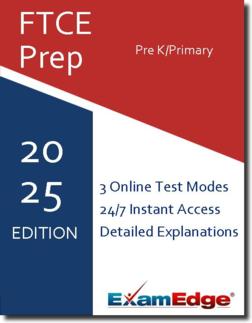FTCE Pre-K / Primary (053) Practice Tests & Test Prep by Exam Edge - Topics
Based on 40 Reviews
- Real Exam Simulation: Timed questions and matching content build comfort for your FTCE Pre-K / Primary test day.
- Instant, 24/7 Access: Web-based FTCE Prekindergarten Primary PK-3 practice exams with no software needed.
- Clear Explanations: Step-by-step answers and explanations for your FTCE exam to strengthen understanding.
- Boosted Confidence: Reduces anxiety and improves test-taking skills to ace your FTCE Prekindergarten Primary PK-3 (053).

Understanding the exact breakdown of the FTCE Prekindergarten Primary PK-3 test will help you know what to expect and how to most effectively prepare. The FTCE Prekindergarten Primary PK-3 has 205 multiple-choice questions The exam will be broken down into the sections below:
| FTCE Prekindergarten Primary PK-3 Exam Blueprint | ||
|---|---|---|
| Domain Name | % | Number of Questions |
| Developmental Knowledge | ||
| Knowledge of child growth and development | 14% | 7 |
| Knowledge of foundations of early childhood (PreK–3) education | 5% | 3 |
| Knowledge of developmentally appropriate practices | 20% | 10 |
| Knowledge of developmentally appropriate curricula | 12% | 6 |
| Knowledge of developmentally appropriate intervention strategies and resources available to meet the needs of all students |
15% | 8 |
| Knowledge of diagnosis, assessment, and evaluation | 14% | 7 |
| Knowledge of child guidance and classroom behavioral management | 13% | 7 |
| Langauge Arts And Reading | ||
| Knowledge of literacy and literacy instruction | 24% | 13 |
| Knowledge of fiction and nonfiction genres including reading informational texts (e.g., literary nonfiction, historical, scientific, and technical texts) |
20% | 10 |
| Knowledge of reading foundational skills | 24% | 13 |
| Knowledge of language elements used for effective oral and written communication | 22% | 11 |
| Knowledge of assessments to inform literacy instruction | 10% | 5 |
| Mathematics | ||
| Knowledge of effective mathematics instruction | 23% | 12 |
| Knowledge of algebraic thinking | 16% | 8 |
| Knowledge of number concepts and operations in base ten | 30% | 16 |
| Knowledge of measurement and data collection and analysis | 15% | 8 |
| Knowledge of geometric and spatial concepts | 16% | 8 |
| Science | ||
| Knowledge of effective science instruction | 19% | 10 |
| Knowledge of the nature of science | 19% | 10 |
| Knowledge of earth and space sciences | 20% | 10 |
| Knowledge of the physical sciences | 17% | 9 |
| Knowledge of the life sciences | 25% | 13 |


